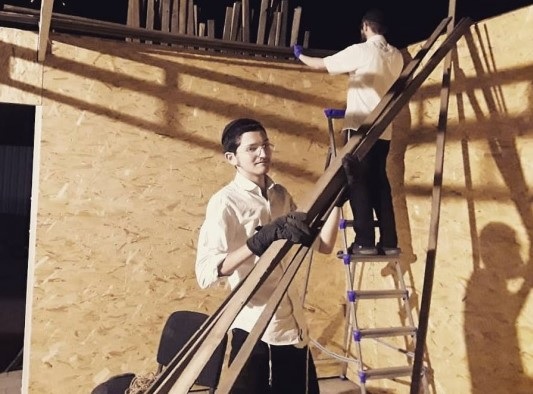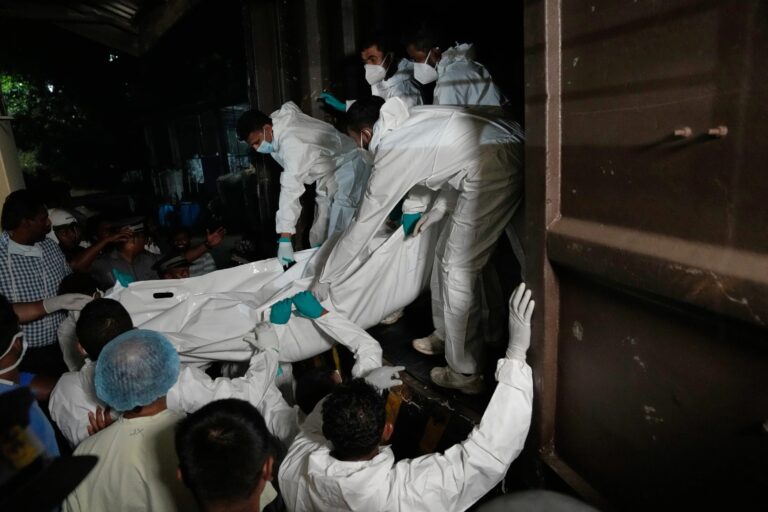A moving story was told by Chabad bochur Shneur Lipskar about his experience at the home of Rabbi Asher Tumarkin, the Chabad shaliach in Kazakhstan, last Tishrei.
Lipskar, who lives in Jerusalem, traveled with two other Chabad bachurim to Karaganda, Kazahkstan for Tishrei of 2019 to assist Rav Tumarkin.
“When we entered his home for the first time, I didn’t see any kids,” Lipskar wrote. “After a few hours passed and no children returned from gan, I suddenly understood that they don’t have children.”
“The thought that they don’t have children hit me. How is it possible to run a Chabad house, to deliver shiurim, to help Jews put on tefillin and return to an empty house? A clean and neat house – too neat, no toys on the floor. No sleepless nights, no children to gently cover during birchas Kohanim. How? How is it possible?”
“We spent the time building a sukkah in the courtyard, davening with the kehilla, helping Jews shake the lulav. And then came Simchas Torah. We’re used to an enthusiastic kehilla on Simchas Torah…but in Kazakhstan it wasn’t like that. There were mainly elderly Jews there and it was quiet.
“But we didn’t want to simply fulfill our obligation by dancing. We wanted to truly rejoice. So we began to drink – another cup and another cup…we were singing and hugging the sifrei Torah.
“Afterward we had a seudah. The other two bochurim sobered up somewhat. I didn’t. Rav Asher said a devar Torah. We sang and then I requested that we sing Yeladim by Eviatar Banai. [A moving song about children by a well-known Israeli singer]. No one else knew it so I sang it by myself and everyone was quiet and listened. The song is about children, on the emotional moment that one’s child leaves to school with only his father’s tefillah to accompany him. The song suddenly reminded me of the ‘thing’ that no one mentions. But I was drunk enough not to think about what’s appropriate to say or not say.
“I shouted with great pain: ‘R’ Asher, you’re a good Jew! You have a heart of gold! You could have been some Chabadnik in Kfar Chabad but you chose to be a shaliach of the Rebbe! You gave your whole life for the Rebbe! You deserve children!’
“There was silence. R’ Asher turned white but I continued to talk. ‘We here are paskening that you deserve a ben zachar (a baby boy) this year. I swear to you that you’ll have a ben zachar this year!’
“I then hugged him enthusiastically. R’ Asher whispered Amen with intense kavanah. And I was carried to my room by my friends (where I promptly threw up).”
Lipskar continued his story: “An hour ago I got a phone call from the bochurim that were with me. After almost ten years with no children, a baby boy was born to R’ Asher today!”
“It’s been exactly nine months since my shelichus [in Kazahkstan].”
(YWN Israel Desk – Jerusalem)












17 Responses
With all do respect to the editorial department, the headline would have been more appropriate to say “Bochur’s Simchas Torah Bracha…” There is a unique power on Simchas Torah of bracha and to minimize it in favor of a good headline is not in the spirit of the wonderful work this website does.
Today is 9 months since הושענא-רבה; Not since שמחת-תורה when he was inebriated and delivered his incantation.
As they say Chasiddim kenen poilen
Peleh? Probably not. Moyfes? Lol no.
But if you think hkbh wasn’t moved by this bochur, then I think you’re wrong. I’ve said some very silly things to our Creator after a few lechaims, and may have made some demands. They came from the deepest parts of my heart.
Shkoyach to a yid for caring so much it couldn’t be contained by his mouth 🙂
(I sincerely hope that in the three weeks there won’t be any negative comments, I don’t even see possibly how a Jew with a Lev Bassar could in this case, but this is the Internet after all)
Either that, or the embarassment in front of all the people sitting around was his zchus.
Or something else.
A brocha from anyone is a brocha and answering amen is required.
Meforshim ask what was wrong when Sara laughed when the malochim blessed her with a son, after all, they appeared as arabs that worship the dust of their feet, so why shouldn’t Sara laugh at their prediction that she will have a child?!
Meforshim answer (see Ramban?) that when a person hears a brocha that something good will happen, even from a idol worshipping goy, the person must say amen, let Hashem fulfil this brocha! After all, it isn’t the person giving brocha that makes the goodness arrive, but rather Hashem.
A brocha is powerful as Chazal tell us that even a birkas hediot is not to be taken lightly!
Especially, here, a brocha from a bochur (“bochur” means “chosen” because a true bochur is dedicated to Hashem in learning, davening and mitzvos b’hidur without distractions of parnasa and family obligations of a married individual); one that is osek b’zorchei tzibur and going on a “shlichus lidvar mitzva” which gives him the power of the meshalayach (the sender – HKBH); given at a holy time of simchas Torah; when the brocha is given with full love and compassion (like birkas kohamin given b’ahava); at a gathering of yidden (that the shchina is present); after saying l’chaim (and l’chaim v’livracha); and a brocha given with a “psak” (decree – as in tzaddik gozer, proclamation); followed by a heartfelt amen…surely this is very powerful to break all barriers!
This story did not just break now, it was on the K. website in Eretz Yisroel website like ten days ago, יא תמוז.
However, according to it, the blessing was given on Simchas Torah, כג תמוז. So there was no son born exactly nine months after the drunken blessing. The birth was earlier, around Yom Kippur it seems. So maybe it came from davening on Yom Kippur.
People can imagine and fantasize, but the truth is not necessarily as stories like this want you to believe.
(Some slight errors in earlier submitted comment, corrected in this version, please ignore earlier version of comment.)
This story did not just break now, it was on the K. website in Eretz Yisroel like ten days ago, יא תמוז.
However, according to it, the blessing was given on Simchas Torah, כג תשרי. So there was no son born exactly nine months after the drunken blessing. The birth was earlier, around Yom Kippur it seems. So maybe it came from davening on Yom Kippur.
People can imagine and fantasize, but the truth is not necessarily as stories like this want you to believe.
Why is this a good story? A bochur should NEVER get drunk? It does NOT matter what the “amazing” outcome might be!!
A good thing never comes out of an aveirah??!??
Considering simchas torah was oct 20th and 10 months later(yes full term is 9 full months) would be august 20th…today is july 13th so while conceivably possible it most probably had nothing to do with your drunk bracha…sorry just dont like the premise of this story that such a bracha can come from such a misguided place or to take credit for that.
Cool story bro. What’s the lesson here ( Assuming the story is accurate in the first place)? We should get drunk on Yom Tov and throw up on someone else’s floor? Birchas hediot is still a hediot!
BTW I have another pshat in the maaseh. By not picking up the drunken shlub and throwing him out of the house, especially given his painfully insensitive choice of song (I do hope the bedroom floor wasn’t carpet), the good Rabbi and Rebbetzin became of the neelavim veinam olvim, and it it was in their own zechus that they merited a son!
Drunkenness is totally out of place on Simchas Torah. But there is an addiction to “mashkeh.”
The story and message here: compassion, empathy, noseh b’ol chavero, daven and beseech for another yid, give a brocha – anyone is able to do that, dedicate time for tzorchei tzibur, ahavas yisroel, mesiras nefesh, saying l’chaim, a chassidic farbrengen can accomplish the impossible…a powerful story with many lessons and inspirations.
Chazal tell us: nichnas yayin yotzeh sod (when the alcohol enters, the hidden becomes revealed).
Drinking alcohol and saying l’chaim actualized things that were concealed.
There is valid reason that alcohol is used for all simchos (bris, chuppah etc), yom tov, shabbos
with all due respect to thr rebbetzin….wine is whats used not alcohol…and not bottles of it
Realisticguy might not know that alcohol is called Yayin Yoshon. True it does not have din of wine but rather chamar medina, but on alcohol one can make havdalah, daytime kiddush etc. According to Rambam, real wine MUST be alcoholic and capable of making the person drunk (not simply grape juice). And the minhag yisroel is to wish l’chaim on aloholic drinks (not on grape juice).
Some people cringe when hearing the words alcohol or drunk. In truth, anything in excess can become addictive and harmful.
Take gambling as an example. Many become addicted and it has destroyed families. But does that created a disgust for “goral” (- lottery)? Eretz Yisroel was divided by goral! Each Yom Kippur the sa’ir (goat) was chosen by goral!
Indeed, some people are “ill” and cannot participate in ANY form of gambling, and likewise, they must not let wine or alcohol pass their lips or even be in their homes, but that is not the norm.
For them alcohol is poison, like those with severe allergies, it can cause them untold harm. But not to “healthy” people. A nazir must bring a chatos because he deprived himself from wine, an earthy pleasure that is muttar.
Duchan is said on simchas Torah at shachris because kohanim might make kiddush and be drunk by mussaf (and a drunk kohein cannot duchan)- it is anticipated to drink and be drunk on simchas Torah! That is the nor. To cringe at the words drunk or alcohol is a reaction caused by those that have an unhealthy “illness” to alcohol. L’chaim!!!